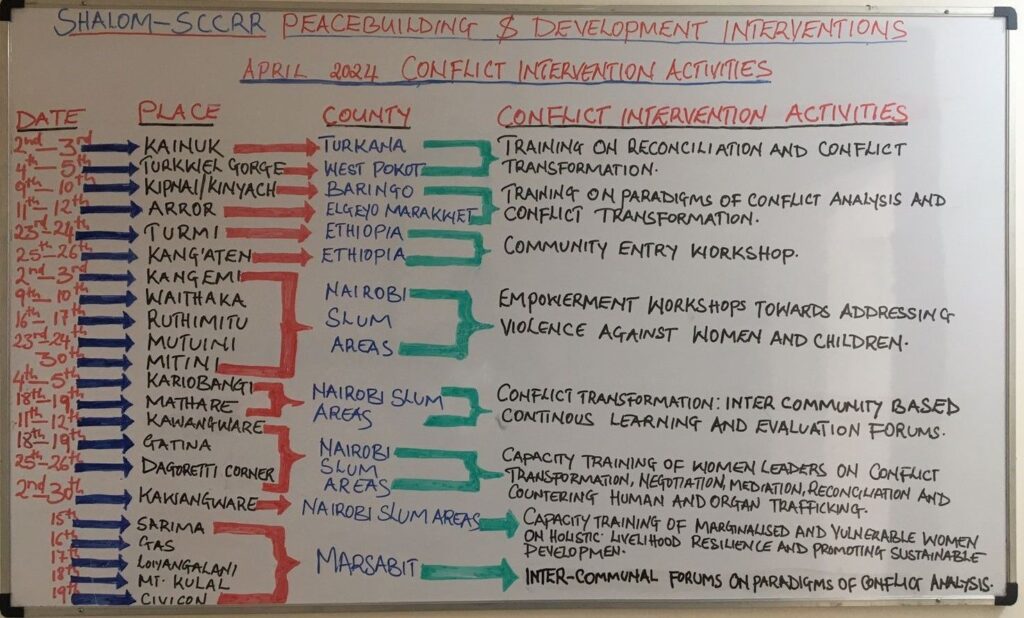By Paulson Erot
Shalom Center for Conflict Resolution and Reconciliation works with key opinion shapers that are influential in the grassroots level of the society. After Shalom has researched on the nature, the context and the dynamics of conflict in the communities, it identifies and engages with key influential opinion shapers and duty bearers in such communities. Shalom takes these relevant stakeholders equip with analytical knowledge and skills of conflict prevention, management, resolution and transformation.
With its main goal to equip key opinion shapers in Kibera, SCCRR has worked and cooperated with the county government, Trocaire, Human Rights Office, Christ the King Parish, and other duty bearers. Since January 2015, Shalom formed and engaged three consistent and working community groups in Kibera, Nairobi County. These groups were taken through intensive training that comprised of five major modules: conflict mapping, conflict paradigms; managing identity-based and natural resource-based conflicts; conflict resolution and reconciliation; and finally, conflict transformation.
September 26th 2015 was a big day for SCCRR and its trainees (graduates) in Kibera. On this day, Shalom graduated 120 key influential opinion shapers and duty bearers in the largest urban slum in Africa. This was the highest number of people to have ever been graduated at once in Kibera through the work of one organization. This is a very high standard that Shalom has put for other organizations operating in Kibera and other parts of the country to emulate.

From left: Chief Ombata, Mr. Paul Healy, Chief Alio, Mr. Omondi, Fr. Oliver, Ms. Eunice (Kibera Community Leaders), and two police officers.
The graduates comprised of the local administrators, district peace committee leaders, religious leaders, women and youth leaders on the day. Each of the three groups performed a drama that encouraged people in communities to always try to manage their conflicts in a peaceful manner. The key message put forth was that, although people in the society can have differences and disagreements in various aspects (be it political, economic, social, cultural, etc.), they can still coexist peacefully with each other.
The graduation ceremony featured key people including Mr. Paul Healy (Country Director, Trocaire-Kenya); Fr. Oliver Noonan (Country Director, SCCRR) who led the SCCRR’s team of Mr. Peterlinus Ouma (Program Manager, SCCRR), Mr. Godfrey Okoth (Assistant Program Manager, SCCRR), Ms. Judy Akedi (Program Officer, SCCRR), Mr. Paulson Erot (Program Officer, SCCRR) and Mr. Francis Mwangi (M&E, SCCRR); Ms. Joanne Mulinge (Program Manager, Human Rights Office); the representatives of Christ the King Parish; Mr. Philip Omondi (Secretary, Peacebuilding Committee, Kibera and Langata); Mr. Clement Ombati (Assistant chief, Laini Saba, Kibera); Mr. Alio Guyo (Assistant chief, Shilanga, Kibera); the Police and other invited guests.
All the speakers acknowledged and appreciated the great work of peacebuilding that SCCRR has been doing in Kenya since its inception in 2009, especially in Kibera.

Fr. Oliver Noonan speaking during the graduation.
Mr. Paul Healy applauded the tangible work of Shalom in equipping the relevant stakeholders with knowledge and analytical skills of peacebuilding in Kenya, and particularly in Kibera slum. He reiterated that all stakeholders should be part and parcel of peace promotion. Mr. Healy also reminded the graduates and all in attendance that everything good or bad begins from the heart. “… The gun does not kill; the gun is an extension of your hand, your hand is an extension of your arm and your arm is an extension of your heart… If you really want to kill someone, it all starts in your heart.” His message was that, if we want to change, we have to start changing from our ‘inner self’ and this can be portrayed in our behaviors. The real change starts from the inside and not from the outside.
On behalf of Shalom, Fr. Oliver acknowledged and appreciated the cooperation and the contribution that officials from Trocaire, Human Rights Office, Christ the King Parish, the government and duty bearers who have supported the work of Shalom in its quest to equip key opinion shapers in Kibera. Fr. Oliver eluded that “… what brought us together is the common goal which is for all people to live in peace and to help each other to learn and to live with our differences by managing our conflicts in a peaceful manner…” He added that it is the contributions of many that create an enabling environment that will promote peace and security in communities. Transformation begins from the heart, onto relationships, improving institutions and ridding culture of all that undermines human rights.
Mr. Philip Omondi acknowledged that the knowledge and skills that the graduates have acquired through SCCRR’s training and workshops, have enabled them to manage various disputes and conflicts arising in Kibera including ethnic tensions, landlords-tenants conflicts, and domestic violence.
Chief Ombati also acknowledged the peacebuilding work of Shalom. He confidently remarked that “if it was not because of these knowledge and skills, there could have been escalation of various conflicts in Kibera slum. Thank you Shalom for investing in us and we urge you to continue working with us in promoting peace in our communities…” Chief Alio Guyo also agreed with Chief Ombati’s remarks and pointed out on how Shalom’s trainings have helped him as a person. Since he joined Shalom’s trainings back in 2012, Chief Alio has acquired invaluable knowledge and skills in conflict management and resolution and he argued that “… now I am a better chief when it comes to managing and resolving disputes and conflicts in my sub-location.”
All the speakers applauded and congratulated the graduates for acquiring the analytical skills of peacebuilding and learning that without these vital skills, they cannot be able to manage various conflicts that they may encounter in their communities. During the ceremony, certificates of participation were received by the graduates, followed by a photographs and meal. The self-esteem and actualization of potentiality felt by the graduates was tangible as they engage in conflict resolution in their communities.

Proud graduates and participants in the ceremony.

